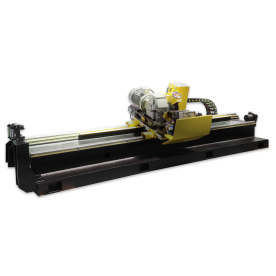Trending News
16 October, 2024
6.82°C New York
****
In the realm of modern welding technology, the introduction of solid state HF (high-frequency) welders has revolutionized the industry. Among their various features, the addition of remote control functionalities has emerged as a game-changer, offering significant advantages in efficiency, precision, and operator safety. This article delves into the intricacies of solid state HF welders with remote control and explores how they enhance industrial applications.

What is a Solid State HF Welder?
A solid state HF welder is an advanced welding machine that uses high-frequency electrical currents to create a strong bond between two metal components. Unlike traditional welding methods, solid state technology employs solid-state components to generate the high-frequency signals, which leads to improved performance and reliability. This innovation has made solid state HF welders an essential tool for various industrial applications, including automotive, aerospace, and manufacturing.
Key Features of Solid State HF Welders
1. **High Energy Efficiency**: One of the primary benefits of solid state technology is its energy efficiency. These welders consume less power while delivering superior performance, reducing operational costs for businesses.

2. **Consistent Weld Quality**: Solid state HF welders provide precise control over the welding parameters, ensuring consistent weld quality. This is crucial in applications where the integrity of the weld is paramount.
3. **Compact Design**: Many solid state HF welders feature a compact design, allowing them to fit into tight spaces and be easily transported within the workshop. This is particularly advantageous for industries that require mobility in their welding operations.
4. **Reduced Maintenance**: The solid-state design minimizes the need for frequent maintenance compared to traditional vacuum tube welders, leading to lower downtime and maintenance costs.
The Role of Remote Control in Welding
The integration of remote control technology into solid state HF welders has significantly enhanced their usability and safety. Here are a few aspects of how remote control impacts welding processes:
1. **Increased Operator Safety**: Remote control functionality allows operators to control the welding process from a safe distance. This is particularly important in hazardous environments or when working with high-voltage equipment, as it reduces the risk of injury.
2. **Enhanced Precision and Control**: Remote controls enable operators to adjust settings such as power levels, frequency, and duration without having to be physically present at the machine. This is particularly useful for complex welding tasks that require precise adjustments on the fly.
3. **Streamlined Operations**: With remote control capabilities, various welding parameters can be monitored and adjusted in real-time. This leads to optimized processes, reducing the time taken for setup and allowing for quick adjustments during the welding process.
4. **Improved Workflow**: By allowing multiple operators to manage different aspects of the welding process from a distance, remote-controlled welders can significantly improve workflow efficiency. This is especially beneficial in large-scale manufacturing environments where time is of the essence.
Applications of Solid State HF Welders with Remote Control
The versatility of solid state HF welders makes them suitable for a wide range of applications. Industries such as automotive, aerospace, and electronics benefit greatly from this technology. For instance, in automotive manufacturing, solid state HF welders are used for joining thin metal sheets, ensuring high-strength bonds while preserving the integrity of the materials. The remote control feature further enhances the speed and flexibility of production lines.
In the aerospace sector, where precision is non-negotiable, solid state HF welders help in bonding components of aircraft with exacting standards. The ability to monitor and adjust welding parameters remotely allows engineers to meet stringent safety regulations effectively.

Conclusion
Solid state HF welders with remote control capabilities represent a significant advancement in welding technology. The combination of energy efficiency, consistent weld quality, and enhanced safety features make them an invaluable asset in various industrial applications. As manufacturers continue to seek innovative solutions to improve productivity, these advanced welding machines are poised to play a crucial role in shaping the future of welding. Embracing this technology not only results in cost savings but also ensures that operators can work in safer, more efficient environments. Thus, solid state HF welders with remote control are not just tools; they are essential components of modern industrial practices, driving innovation and excellence in welding methodologies.Tube making machine with cutting function